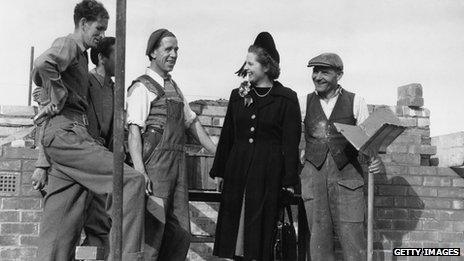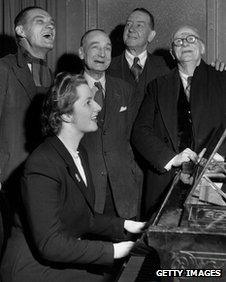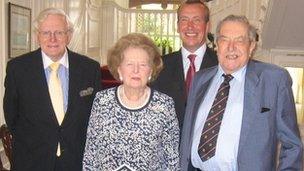Margaret Thatcher: Early electoral defeats remembered
- Published

Margaret Thatcher was the youngest Conservative candidate in the 1950 general election when she stood in Dartford
It was in the Kent town of Dartford that a young grocer's daughter from the East Midlands cut her political teeth.
Margaret Roberts, soon to become Thatcher, twice lost the general election in the safe Labour seat in 1950 and 1951.
But it was the beginning of a political journey that was to see her become the country's first female prime minister.
She would also be remembered negatively in Kent for the closure of the Royal Navy dockyards in Chatham and the last of the county's coal mines.
But she was fundamental in driving forward plans for the Channel Tunnel between Folkestone and Calais, which brought many jobs to the area.
'Not in my time'
Dorothy Shakespeare, who campaigned with Lady Thatcher in both elections, remembered her as a "warm person".

Margaret Thatcher was touted as a "future prime minister"
However, she doubted whether she would be able to climb the ranks in a male dominated world.
She said: "At the end of her [Lady Thatcher's] speech at an eve of poll meeting, the chairman said, 'ladies and gentlemen I would like you to know that you have just been listening to a future prime minister'.
"And I said to myself, 'not in my time'."
Although Lady Thatcher lost twice in Dartford, it was during her campaign that she met her husband Denis before marrying him in 1951.
Another setback occurred when she put herself forward as the Conservative candidate for the former Kent constituency of Orpington, but was rejected in 1954.
The town's current MP, Jo Johnson, said: "History could've been so different in many ways.
"Orpington, which I have the honouring of representing, unbelievably rejected her as a candidate in 1954 and it almost snuffed out her career.
"Back then it was felt a young mother of twins simply couldn't be a candidate."
She eventually was selected for the safe seat of Finchley in North London where she became an MP in 1959.
'Disappeared'
It was during Lady Thatcher's tenure as prime minister that the Royal Navy dockyards closed in Chatham in 1984.
She was, however, to make two visits to the dockyards after her retirement.

Lady Thatcher made two visits to Chatham Dockyards after she retired
Paul Clark, who was a union representative and former Labour MP for Gillingham, said the decision to close the dockyard had a devastating effect on the Medway towns.
He said: "Some 400 years... of the Medway towns that had been built on the dockyard and all the people that worked there - suddenly overnight that had disappeared.
"That was as a consequence of the strategic defence review that was undertaken by Margaret Thatcher and her defence minister."
However, jobs were brought to the county with the construction and management of the Channel Tunnel.
John Noulton, who is a former director of public affairs at Eurotunnel and played a key role in negotiations with France over the Channel Tunnel treaty, said the project "wouldn't have happened without her".
He said: "What pleases me most is how popular it is with British people who were root and branch opposed to it when it was first proposed.
"And how little adverse impact it has had on Kent and the benefits it has brought to Kent."